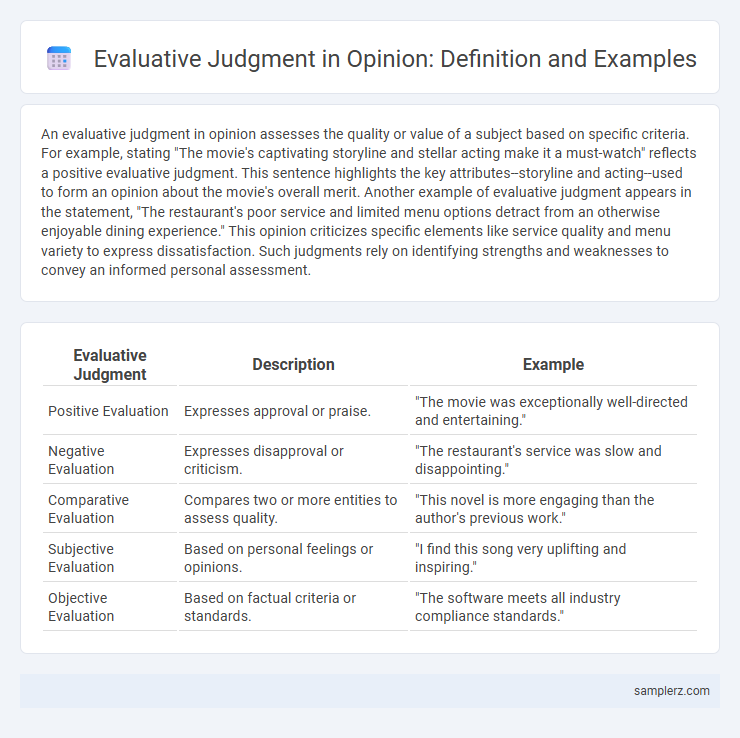An evaluative judgment in opinion assesses the quality or value of a subject based on specific criteria. For example, stating "The movie's captivating storyline and stellar acting make it a must-watch" reflects a positive evaluative judgment. This sentence highlights the key attributes--storyline and acting--used to form an opinion about the movie's overall merit. Another example of evaluative judgment appears in the statement, "The restaurant's poor service and limited menu options detract from an otherwise enjoyable dining experience." This opinion criticizes specific elements like service quality and menu variety to express dissatisfaction. Such judgments rely on identifying strengths and weaknesses to convey an informed personal assessment.
Table of Comparison
| Evaluative Judgment | Description | Example |
|---|---|---|
| Positive Evaluation | Expresses approval or praise. | "The movie was exceptionally well-directed and entertaining." |
| Negative Evaluation | Expresses disapproval or criticism. | "The restaurant's service was slow and disappointing." |
| Comparative Evaluation | Compares two or more entities to assess quality. | "This novel is more engaging than the author's previous work." |
| Subjective Evaluation | Based on personal feelings or opinions. | "I find this song very uplifting and inspiring." |
| Objective Evaluation | Based on factual criteria or standards. | "The software meets all industry compliance standards." |
Defining Evaluative Judgment in Opinion Writing
Evaluative judgment in opinion writing involves assessing the quality, value, or significance of a subject based on specific criteria and evidence. This process requires balancing subjective viewpoints with objective analysis to support claims effectively. Clear evaluative judgments enable writers to persuade readers by highlighting strengths, weaknesses, or overall impact within the topic discussed.
Key Features of Evaluative Judgment Statements
Evaluative judgment statements in opinion pieces typically emphasize criteria such as quality, effectiveness, and relevance to substantiate the assessment. They often include explicit language expressing approval or disapproval, incorporating subjective terms like "excellent," "poor," or "unsatisfactory" to convey the evaluator's stance. Key features also involve clear justification based on evidence or personal experience, making the judgment persuasive and grounded.
The Role of Criteria in Making Evaluative Judgments
Evaluative judgments rely heavily on clearly defined criteria to assess quality, effectiveness, or value, enabling objective comparisons across different subjects. The role of criteria in making evaluative judgments ensures consistency and transparency, guiding individuals to base opinions on relevant standards rather than personal biases. This structured approach enhances the credibility of opinions by grounding them in measurable or observable factors.
Examples of Positive Evaluative Judgment in Reviews
Positive evaluative judgments in reviews often highlight specific qualities such as exceptional customer service, impeccable product durability, or outstanding design aesthetics. For example, a review might commend a smartphone for its user-friendly interface and long-lasting battery life, expressing clear satisfaction. These assessments provide actionable insights for potential buyers by emphasizing the product's strengths and superior performance.
Negative Evaluative Judgments: Illustrative Cases
Negative evaluative judgments often manifest in opinion pieces criticizing policies that exacerbate social inequality or environmental degradation. For example, critiques of corporate practices highlight exploitative labor conditions and unsustainable resource extraction as detrimental to community welfare and ecological balance. Such judgments emphasize the ethical lapses and long-term harm caused by prioritizing profit over social responsibility.
Balancing Objectivity and Subjectivity in Evaluative Opinions
Evaluative judgment in opinion requires balancing objective criteria, such as factual accuracy and logical consistency, with subjective elements like personal preferences and emotional responses. Effective opinions integrate quantifiable data or evidence while acknowledging individual perspectives, ensuring a nuanced assessment. This approach fosters credibility and relatability, enabling audiences to engage with both the reasoning and the personal stance behind the evaluation.
Impact of Evaluative Judgment on Reader Perception
Evaluative judgment shapes reader perception by influencing emotional responses and guiding value-based interpretations, which can enhance engagement and trust in the opinion presented. By explicitly stating positive or negative assessments, the writer steers readers to view facts through a particular ethical, cultural, or practical lens, making arguments more persuasive. This impact is evident in how readers internalize opinions, often adopting the author's stance or questioning their own beliefs.
Using Evidence to Support Evaluative Opinions
Evaluative judgments in opinion pieces rely heavily on using evidence such as statistics, expert testimony, and real-world examples to substantiate claims, ensuring arguments are credible and persuasive. Citing relevant data or authoritative sources reinforces the evaluator's position, making subjective assessments more objective and trustworthy. This evidence-based approach not only enhances the clarity of the opinion but also fosters reader confidence in the validity of the judgment.
Common Mistakes in Making Evaluative Judgments
Common mistakes in making evaluative judgments often include reliance on personal biases rather than objective criteria, leading to skewed conclusions. Overgeneralization and failure to consider relevant evidence can undermine the validity of the evaluation. Ignoring cultural or contextual factors also weakens the reliability of the judgment.
Effective Language for Expressing Evaluative Opinions
Effective language for expressing evaluative opinions employs precise adjectives and concrete examples to convey clear judgments, such as describing a film as "captivating" or "disjointed." Utilizing comparative terms like "more compelling" or "less persuasive" enhances the strength of the evaluation by directly relating the subject to known standards or alternatives. Emotional resonance, through carefully chosen diction, further deepens the impact of the opinion, making the judgment more relatable and memorable.

example of evaluative judgment in opinion Infographic
 samplerz.com
samplerz.com